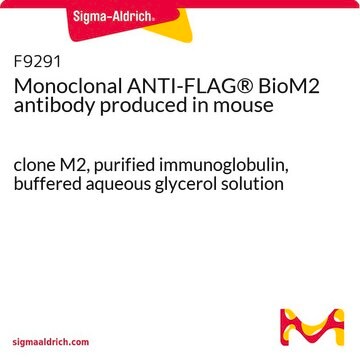F2922
Monoclonal Anti-FLAG® BioM5−Biotin antibody produced in mouse
clone M5, purified immunoglobulin, buffered aqueous solution
About This Item
Produits recommandés
Source biologique
mouse
Conjugué
biotin conjugate
Forme d'anticorps
purified immunoglobulin
Type de produit anticorps
primary antibodies
Clone
M5, monoclonal
Forme
buffered aqueous solution
Technique(s)
western blot (chemiluminescent): 2 μg/mL
Isotype
IgG1
Conditions d'expédition
dry ice
Température de stockage
−20°C
Description générale
Application
The product binds the FLAG peptide only when it is located at the amino terminus preceded by a methionine. Binding is not Ca2+-dependent. It is useful for detecting cytoplasmically expressed Met-FLAG® fusion proteins in mammalian crude cell extracts, but not recommended for fusion proteins expressed in E. coli.
It can be used for immunodetection methods using avidin- or streptavidin-conjugated reporter enzymes such as streptavidin-peroxidase. Primary antibody conjugates are preferred when using murine cells as the recombinant protein host.
Browse additional application references in our FLAG® Literature portal.
Caractéristiques et avantages
Forme physique
Informations légales
Vous ne trouvez pas le bon produit ?
Essayez notre Outil de sélection de produits.
Code de la classe de stockage
12 - Non Combustible Liquids
Classe de danger pour l'eau (WGK)
WGK 3
Point d'éclair (°F)
Not applicable
Point d'éclair (°C)
Not applicable
Certificats d'analyse (COA)
Recherchez un Certificats d'analyse (COA) en saisissant le numéro de lot du produit. Les numéros de lot figurent sur l'étiquette du produit après les mots "Lot" ou "Batch".
Déjà en possession de ce produit ?
Retrouvez la documentation relative aux produits que vous avez récemment achetés dans la Bibliothèque de documents.
Notre équipe de scientifiques dispose d'une expérience dans tous les secteurs de la recherche, notamment en sciences de la vie, science des matériaux, synthèse chimique, chromatographie, analyse et dans de nombreux autres domaines..
Contacter notre Service technique








